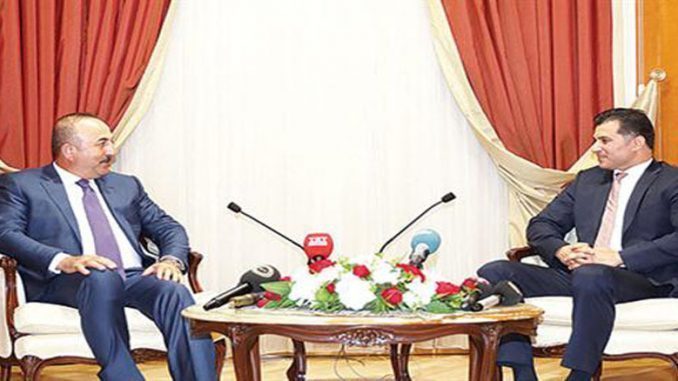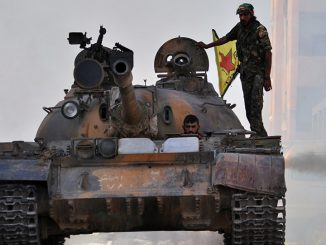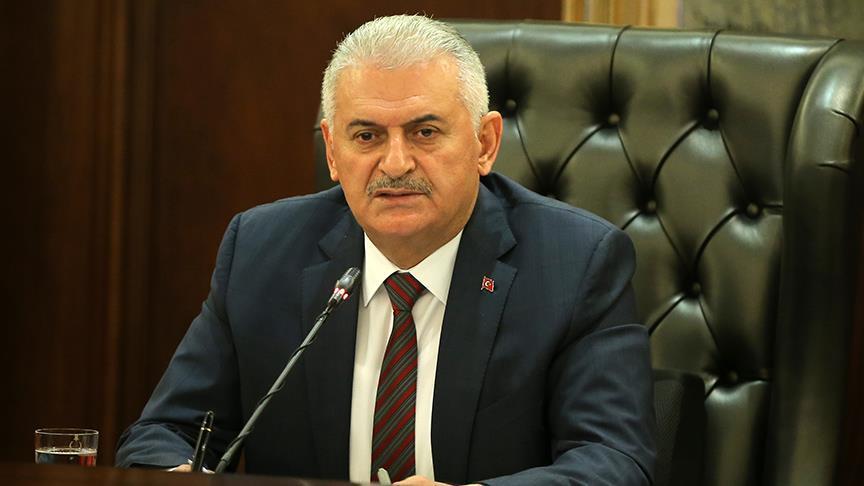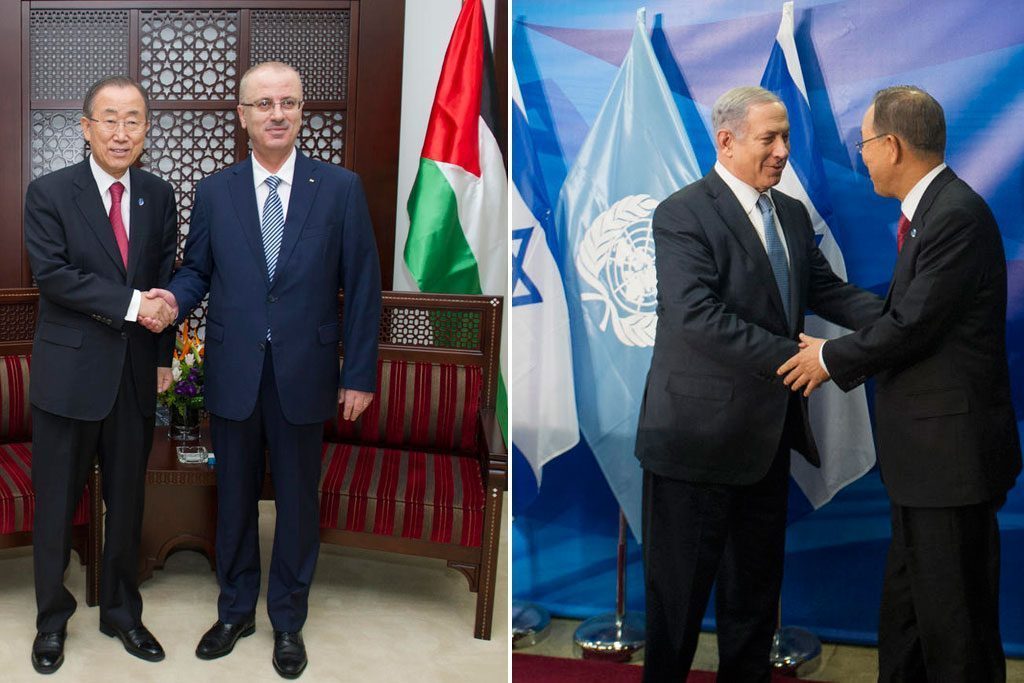
Turkish President Erdoğan reportedly confirmed that he will attend the five-party Cyprus conference that will be held in Geneva on Jan. 12 and assured Turkey’s support to the KKTC government in the upcoming negotiations. Also, the Turkey-Turkish Cyprus foreign movement has witnessed remarkable activity recently.
Turkish-Cypriot PM Özgürgün visits Ankara
Prime Minister Özgürgün’s visit took place ahead of the Geneva, Switzerland talks held between Jan. 9-12, which is widely considered as the last chance for the unification of Cyprus.
Sources from the Turkish Prime Ministry confirmed that during the meetings that took more than two hours, the two leaders and their delegations talked about the latest developments of peace negotiations and the implementation details of the 2016-2018 Turkey-KKTC economic and financial cooperation protocol.
According to the protocol, Turkey will grant a transfer of TL 1.2 billion ($340 million) to the KKTC in financial aid every year, while asking the KKTC government to initiate several reforms to restructure state institutions in order to have a sustainable economy.
Moreover, implementation of the energy project that aims to connect the KKTC power network with Turkey, via an underwater cable network, was also discussed between the two prime ministers.
Following the prime ministers’ meeting, Özgürgün was received by President Erdoğan. In a meeting that lasted just over an hour, the two discussed the current stage of the peace talks and the upcoming Geneva talks.
In the meeting, President Erdoğan reportedly confirmed that he will attend the five-party Cyprus conference that will be held in Geneva on Jan. 12 and assured Turkey’s support to the KKTC government in the upcoming negotiations.
On the other hand, Özgürgün underlined that there was no discrepancy between Turkey and the KKTC in critical issues such as Turkey’s effective status as a guarantor state.
Prior to the five-party conference, the KKTC delegation, led by Turkish Cypriot President Mustafa Akıncı and the Greek Cypriot delegation led by counterpart Nicos Anastasiades, will hold talks in Geneva on Jan. 9.
Speaking ahead of the crucial meeting, Akıncı said they are unwavering and determined, with the goal of establishing a new federal Cyprus where Cypriots can live equally in freedom and security.
“It is not possible to determine how these meetings will conclude but we shall be attending the talks in Geneva, determined to achieve the goal of establishing a new federal Cyprus where Turkish Cypriots will be able to live in equality, freedom, security and where they can exercise their own political will,” Akıncı said on Saturday in his New Year’s message.
Meanwhile, Greek Cypriot President Anastasiades said the task ahead was a difficult one.
“There remain significant differences on substantive issues fundamental to a Cyprus solution,” Anastasiades said on Saturday.
Ankara wants lasting solution on Cyprus, says Turkish FM
Turkish Foreign Minister Mevlüt Çavuşoğlu said Aug. 31 that Turkey will continue to do its part for a just and lasting solution to the Cyprus issue.
Çavuşoğlu’s remarks came during a press conference in Nicosia alongside Turkish Cypriot Prime Minister Hüseyin Özgürgün.
“Turkey will support Cyprus peace talks as it always has,” Çavuşoğlu said, adding that Turkey was closely following developments on the Cyprus issue.
Turkish FM meets Turkish Cypriot President
Çavuşoğlu also met the Turkish Cypriot President Mustafa Akıncı, followed by a joint press conference.
“We will continue to give support to a solution that would be accepted by both parts [of the island],” Çavuşoğlu told reporters alongside Akıncı.
Çavuşoğlu said the aim was to ensure a “permanent” peace and solution, adding: “We are ready to make any kind of contribution, including trust-building steps and measures.”
Akıncı for his part said they set this year as the target year for a solution.
Akıncı and Greek Cypriot President Nicos Anastasiades are engaged in a marathon of meetings until mid-September, during which they will meet seven times and try to resolve the remaining conflicting topics before a United Nations General Assembly by the end of September.
“This is the aim for us all. Turkey supports this aim all the way,” Akıncı said. “We strive for a solution that both sides can accept.”
For his part, Özgürgün said that Turkey and Turkish Cyprus were two states but one nation.
Referring to the July 15 failed coup attempt in Turkey, blamed by Turkish officials on the Fethullahist Terrorist Organization (FETÖ), Özgürgün said the Turkish Cypriot administration recognized the group as a terrorist organization.
“Northern [Turkish] Cyprus will not tolerate any negative development in our ‘homeland’ Turkey,” he said, adding, “Because we know that a powerful Turkey means a powerful Northern Cyprus.”
President Erdoğan Receives TRNC Parliament Speaker Siber
Turkey’s President Tayyip Erdogan met with the TRNC Parliament Speaker Sibel Siber in Istanbul on Christmas Day, according to an official tweet.
Siber’s visit to Turkey comes before Turkish Cypriot Foreign Minister Tahsin Ertugruloglu planned visit to hold talks with Turkish Foreign Minister Mevlut Cavusoglu from December 27-28.
According to an official statement from the Turkish Foreign Ministry, Cavusoglu was to “exchange views on the negotiation process regarding the settlement of the Cyprus issue as well as areas of cooperation between Turkey and the Turkish Republic of Northern Cyprus.”
Mapping the territory
One of the outstanding issues between the two parties is believed to be how the future two-zone Cyprus should be mapped. This would include the land area of the two sides, the number of Greek Cypriots under Greek administration and the length of each coastline.
The UN said significant progress has been made on territory, as well as other interconnected issues such as how many people will be able to reclaim homes and property lost during the 1974 invasion by Turkey. Greek Cypriots have said territorial adjustments must allow for at least 100,000 people to reclaim their lost homes and property.
Reunification discussions resumed in May 2015 and both sides had previously said they hoped for a solution by the end of 2016. Once a final agreement is reached, it will be put to both the Turkish and Greek Cypriot communities in a referendum.
The eastern Mediterranean island was divided into a Turkish Cypriot state in the north and a Greek Cypriot state in the south after a 1974 military coup aimed at unification with Greece was followed by the intervention of Turkey as a guarantor power.
In 2004, a peace deal was approved by Turkish Cypriots but rejected by Greek Cypriot voters. Once a final agreement is reached, it will be brought to both the Greek and Turkish Cypriot communities in a referendum.



